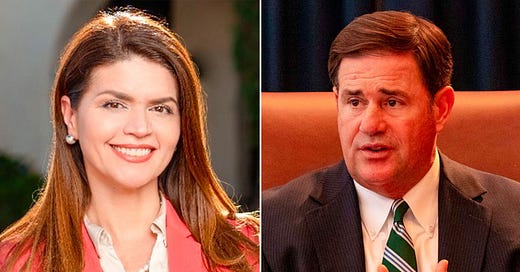🏙️ Tucson's Tax Tussle: Mayor Pushes for 9.2% Sales Tax
💰 The $800 Million Gamble: Tucson's Plan for a Safer City 🧳 Travel Smart: Why Booking with an Agency Matters More Than Ever
Based on the 9/12/24 Buckmaster Show on KVOI-1030AM.
The mayor emphasized that these cuts are not of the city's making but are a result of state legislature decisions that favor "corporate giveaways" over funding for essential city services.
⏮️ ICYMI: From the Last Show…
😽 Keepin’ It Simple Summary for Younger Readers
👧🏾✊🏾👦🏾
🚀 The mayor of Tucson wants to raise 💰 taxes to make the city better. People are talking about 🌊 cool river boat trips in 🌍 Europe and other places. Some 🏨 hotel workers are on strike, which can make traveling tricky. The 🇬🇧 UK is changing its rules for visitors. 💻 Computers are getting smarter and helping make traveling easier and safer at 🛫 airports.
🗝️ Takeaways
🏛️ Tucson proposes 0.5% sales tax increase to fund city services and infrastructure
🚢 River cruises offer intimate travel experiences with access to inland destinations
🏨 Recent hotel strikes highlight the importance of informed travel planning
🛂 UK to implement new Electronic Travel Authorization system in 2024
🤖 AI is already transforming travel security and efficiency at airports
📻 Radio Show Topics
🏛️ Tucson's Fiscal Challenges and Proposed Solutions
Mayor Regina Romero's interview provided a comprehensive look at Tucson's current fiscal challenges and the city's proposed solutions. The cornerstone of these solutions is a new half-cent sales tax increase that, if approved, would raise Tucson's total sales tax to 9.2%. This proposal, dubbed the "Safe and Vibrant City" measure, aims to generate $800 million over the next decade.
The mayor justified this increase by pointing to the impact of state-level policy changes, specifically the Ducey-era flat tax. According to Romero, this has resulted in a $27 million hit to Tucson's budget this year, with potential cuts of up to $40 million expected in the coming years. She emphasized that these cuts are not of the city's making but are a result of state legislature decisions that favor "corporate giveaways" over funding for essential city services.
"We've got to take care of ourselves," Romero stated, highlighting the need for local solutions in the face of state-level decisions that negatively impact city budgets. She argued that without this proposed investment, Tucson would struggle to maintain essential services and recover from years of underfunding.
The proposed tax increase would fund a wide array of city programs and services:
Public Safety: Bolstering fire and police departments, including the purchase of a fixed-wing aircraft for police use to avoid dangerous high-speed chases. This also includes updating aging police vehicles, some of which date back to 2007.
Affordable Housing: Expanding efforts to address housing issues in the city, including the Housing First program.
Violence Prevention: Implementing programs to reduce crime and improve community safety, including the creation of an office of violence prevention and intervention.
Early Childhood Education: Investing $1 million annually in educational programs for young children.
Community Safety Initiatives: Expanding programs like Housing First, Community Safety, Health and Wellness, and the 311 system.
Infrastructure Improvements: Addressing long-standing issues with roads, parks, and other city facilities that have suffered from lack of investment.
Youth Workforce Development: Allocating $1 million annually to programs aimed at preparing young people for the job market.
Substance Abuse and Mental Health: Working in partnership with Pima County and other entities to address opioid addiction and mental health issues, including a $5 million investment in a justice transition center and another $5 million for a sobering alternative facility.
Mayor Romero highlighted several programs already created by her administration, suggesting that the new funding would help expand and sustain these efforts. She emphasized a holistic approach to community safety and development, involving various city departments and community partners. The mayor pointed out that many of these programs, such as the Community Safety, Health and Wellness Program, were created in response to specific incidents and community needs, demonstrating the city's adaptability and responsiveness.
The mayor expressed confidence in Tucson voters' willingness to support this investment, citing previous successful propositions where voters approved similar measures for city improvements. She argued that Tucsonans have consistently shown a desire to invest in their community when given the opportunity, with support for such measures increasing over time. Romero referenced Proposition 411, which saw 73% voter approval for road repairs and pedestrian safety improvements, as evidence of this trend.
Additionally, Romero touched on the Regional Transportation Authority (RTA) and a recent agreement on the RTA-Next program. This program will now move to public listening sessions, indicating a step forward in regional transportation planning. The mayor emphasized the importance of comprehensive community engagement in this process, calling for a third-party consultant to ensure that hard-to-reach communities are included in the dialogue.
Throughout the interview, Mayor Romero stressed the long-term impacts of budget cuts and the need for proactive investment in city infrastructure and services. She argued that without this investment, Tucson would struggle to recover from years of underfunding, citing examples such as aging police vehicles and deteriorating park facilities. The mayor drew parallels to the financial crisis of 2008-2010, noting that the city is still recovering from the severe cuts made during that period.
Romero also addressed potential criticisms of the tax increase, acknowledging that some might argue the city simply needs to budget better. She countered this by emphasizing that the current financial strain is not due to mismanagement but to external factors, particularly state-level policy decisions that have reduced shared revenue to cities.
The mayor framed the "Safe and Vibrant City" measure as part of a larger strategy to create a more prosperous and equitable Tucson. She emphasized that the various components of the plan work together, from violence prevention to youth development to affordable housing, creating a comprehensive approach to community well-being.
In discussing the city's transportation plans, Romero highlighted ongoing efforts to repair residential and arterial roads, funded by previous voter-approved measures. She noted that residents are beginning to see the effects of these investments, with major streets like Tucson Boulevard, Drexel, and Glen receiving significant upgrades.
The interview also touched on the city's plans to issue $127 million in bonds, part of the $225 million approved by voters under Prop 407 in 2018. These bonds will fund further parks and connectivity projects, as well as water infrastructure needs.
Mayor Romero presented the "Safe and Vibrant City" measure as a necessary step for Tucson's future, framing it as an investment in the community rather than just a tax increase. Her arguments centered on the need for local solutions in the face of state-level policy changes that have negatively impacted city budgets. The mayor's vision, as presented in the interview, is one of a comprehensive, forward-thinking approach to city governance, aimed at creating a more resilient, equitable, and prosperous Tucson for all its residents.
🧳 Travel Industry Insights with Ryan Hansen
During his interview, Ryan Hansen, President and Chief Operating Officer of Bon Voyage Travel, provided valuable insights into various aspects of the travel industry. He addressed the recent hotel worker strikes affecting significant cities like San Diego, Honolulu, Boston, and Baltimore. Hansen emphasized the importance of booking through travel agencies during such times, as they have up-to-date information on affected hotels and can help travelers avoid service disruptions.
The conversation then shifted to river cruising, a growing trend in the travel industry. Hansen highlighted the unique benefits of river cruises compared to ocean cruises, including more minor passenger counts, access to inland destinations, and a more intimate travel experience. He discussed popular river cruise destinations such as the Rhine and Danube in Europe, the Mekong in Asia, and even wildlife viewing opportunities on the Chobe River in Africa.
Hansen also touched on upcoming changes in international travel, specifically the UK's new Electronic Travel Authorization (ETA) system, which will begin in early 2024. This system will require travelers from countries like the US and Canada, who previously enjoyed visa-free travel to the UK, to obtain online authorization before their trip.
Lastly, Hansen discussed the role of artificial intelligence in the travel industry. He noted that AI is already being used in airport biometric security systems and in creating traveler profiles for security and efficiency purposes. Hansen expressed optimism that these AI applications will ultimately improve the travel experience for most people.
Throughout the interview, Hansen emphasized the value of using a travel agency like Bon Voyage Travel, highlighting their ability to provide personalized service, insider knowledge, and additional perks for travelers.








